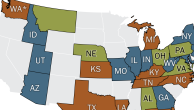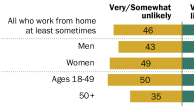During his 2008 presidential campaign, then-candidate Barack Obama said that he intended to overturn President George W. Bush’s policy of allowing faith-based groups that receive federal funding to consider a potential employee’s religion when making hiring decisions. Although a 1972 civil rights law generally exempts religious groups from the prohibition on religious discrimination in hiring, it remains unclear whether this exemption applies when a religious group receives federal funds. The Bush administration, which expanded the flow of federal aid to religious social-service providers, contended that religious groups always have the right to hire on the basis of religion – even when they receive federal funding. But President Obama has suggested that he disagrees with this policy. To explore how the Obama administration might alter Bush’s policy, the Pew Forum turns to church-state scholar Ira “Chip” Lupu.
Featuring: Ira “Chip” Lupu, F. Elwood and Eleanor Davis Professor of Law, The George Washington University Law School
Interviewer: Jesse Merriam, Research Associate, The Pew Research Center’s Forum on Religion & Public Life
Question & Answer
Yes, that is clearly permissible. Although Title VII of the Civil Rights Act, which was passed by the U.S. Congress in 1964, prohibits private employers from, among other things, hiring employees based on their religion, there has always been an exception for religious groups that want to hire based on religion. The original exception, enacted in 1964, applied only to jobs of “religious significance.” But the question quickly arose: Which jobs were religiously significant? While it was clear that a clergy position was religiously significant, it was not clear whether a position such as a parochial school math teacher also was religiously significant.
After much litigation over which jobs were indeed religiously significant, it became clear to Congress that this exception was too vague. So in 1972, Congress amended the exception, expanding it to allow religious groups to engage in faith-based hiring for any job, including those that many would consider religiously insignificant.
This 1972 amendment, however, does not mention whether this rule still applies when religious groups receive federal funding. So while it’s been clear for the past 37 years that religious groups that don’t receive federal money may hire based on religion, it still is not clear whether that right extends to religious groups that do receive federal funds.
How does a religious group become eligible to receive a federal grant for providing social services?
Within the federal government there are 26 grant-making agencies that issue federal grants to groups for the purpose of carrying out a function specified by Congress. For example, the Department of Health and Human Services awards grants to private groups that further the agency’s mission of providing essential human services to needy families. To receive a grant from one of these grant-making agencies, a group must compete with other groups to establish its superior ability to carry out a particular function. Congress often sets conditions on such grants, but it’s the federal agencies that decide which groups will receive them.
What has been the federal government’s policy on whether religious groups that receive federal funding may hire on the basis of religion?
There are three critical periods in the federal government’s changing policy on this issue: between 1972 and 1996, between 1996 and 2001, and between 2001 and today.
When Congress passed the 1972 amendment allowing religious groups to engage in faith-based hiring, it did not mention whether this amendment applied to religious groups receiving federal funding. It wasn’t an issue at the time because the U.S. Supreme Court’s interpretation of the Establishment Clause in the First Amendment to the U.S. Constitution was that “pervasively sectarian” religious groups, such as houses of worship, could not directly receive government funding. Although religiously affiliated philanthropic groups, such as Catholic Charities, were allowed to receive direct funding, faith-based hiring was not a major issue because these groups weren’t hiring on the basis of faith, or if they were, the government wasn’t monitoring their faith-based hiring practices.
In the late 1990s, however, there was a movement toward greater church-state partnerships. This prompted Congress to introduce a Charitable Choice provision into the 1996 welfare reform act. This Charitable Choice provision authorized the Department of Health and Human Services to award grants to religious groups, including houses of worship, that provided social services for needy families. In 1998 and 2000, Congress enacted similar Charitable Choice provisions that sought to allow religious groups to receive federal grants for providing various social services.
These Charitable Choice provisions expressly said that receiving Charitable Choice grants would not affect a religious organization’s Title VII exemption. It remained unclear, however, whether the Charitable Choice provisions required federal agencies to award grants to religious groups without regard to their faith-based hiring.
The Clinton administration did not take a position on this issue because it was understood at the time that the Establishment Clause prevented intensely religious groups from directly receiving federal funding. As a result, very few such groups were applying for or receiving federal grants through Charitable Choice.
But in 2000, in Mitchell v. Helms, the Supreme Court interpreted the meaning of the Establishment Clause to allow the government to fund all religious groups directly as long as there was some assurance that the groups would use the money only for secular programs. So when George W. Bush entered office in 2001, Establishment Clause law allowed religious groups to receive federal grants. Responding to this change in Establishment Clause law, Bush expanded on the Charitable Choice provisions by creating the White House Office of Faith-Based and Community Initiatives, which sought to remove all obstacles that congressional statutes and agency regulations had placed on religious groups seeking federal grants.
As a result, more religious groups began applying for and receiving federal funding, which opened up the whole question of whether a religious group receiving federal funding could take religion into account in hiring decisions. So, unlike the Clinton administration, the Bush administration very quickly had to take a position on this issue. And its position was that religious groups may always engage in faith-based hiring, even if they receive federal funding.
How did the Bush administration implement this policy?
The Bush administration implemented this policy in several ways. First, it declared that the federal government’s general policy on church-state issues was to create a “level playing field” for religious and secular groups alike. According to the administration, this level playing field guaranteed that religious groups could engage in faith-based hiring while receiving federal funding because prohibiting religious groups from engaging in such hiring would require these groups to surrender their religious character if they wanted to compete for federal grants.
Second, in January 2001, within a week of taking office, Bush issued several executive orders (presidential directives on how federal agencies should enforce federal laws) that mandated that all federal grant-making agencies review their rules and remove any regulations that unnecessarily prevented religious groups from participating in federally funded social service programs.
Third, in December 2002, Bush issued an executive order, called the Equal Protection of the Laws for Faith-Based and Community Organizations, which explicitly amended a 1965 executive order that had prohibited the government from contracting with groups that considered religion when making hiring decisions. The 2002 executive order stated that the 1965 order did not apply to religious groups.
Fourth, the Bush administration argued against the legality of federal statutes that prohibited all grant recipients from taking religion into account when hiring employees. A number of federal statutes contain such provisions; for example, the Workforce Investment Act provides that if a group receives federal aid to provide job training, the group must not engage in faith-based hiring. Because Congress had enacted these prohibitions as part of a statute, the Bush administration could not simply override them through executive orders, which have the power to change administrative regulations but not statutes passed by Congress.
So in 2007, the Bush administration’s Office of Legal Counsel (OLC) in the Department of Justice, which advises the president and federal agencies on how to enforce federal laws, prepared a memo arguing that these federal statutes prohibiting faith-based hiring could not be applied to religious groups because of the Religious Freedom Restoration Act (RFRA), a 1993 congressional statute that prohibits the federal government from placing “substantial burdens” on religious groups and practices.
What was the OLC’s legal argument for why applying these statutes to religious groups would violate RFRA?
Under RFRA, when a federal law imposes a “substantial burden” on a religious activity, the government must exempt from that law any group or person suffering from that burden unless the government has a “compelling interest” for not extending the exemption. The OLC contended that prohibiting religious grant recipients from engaging in faith-based hiring imposed a substantial burden on these groups and that the government lacked any compelling interest for placing such a burden on these groups. The thrust of the argument was that these grant conditions create a catch-22: On the one hand, the religious groups may engage in faith-based hiring but not receive federal funding, in which case it would be difficult for some groups to provide needed services; on the other hand, religious groups may receive federal funding but only if they cease faith-based hiring, in which case it would be difficult for some religious groups to maintain their religious character and mission.
This was a novel argument because the conventional understanding of RFRA’s “substantial burden” language was that such burdens arise only from government coercion, such as when the government makes it a crime to engage in a religious act. There was no legal precedent that held that a substantial burden can arise from restrictions on the use of government funding.
Has any court ever considered this argument that applying the grant conditions to religious groups violates RFRA?
No, the question has not arisen because the only way a group would have legal standing (the right to sue) would be if the government denied a group a grant but told the group that it would have received the grant if it had not engaged in faith-based hiring. The Bush administration had no interest in denying a grant on this basis, so that issue has not arisen yet. But this scenario might well arise if the Obama administration were to start denying grants to otherwise qualified religious groups that take religion into account when hiring employees.
What steps might President Obama take to establish a policy requiring that the federal government not fund religious groups engaging in faith-based hiring?
Federal grants are generally governed by three different sets of conditions related to faith-based hiring, so the Obama administration would have to address each set of grant conditions.
First, there are grants for which Congress has specifically prohibited faith-based hiring in the grant language. As I mentioned earlier, in 2007 the Bush administration’s Office of Legal Counsel wrote a memo arguing that applying such grant conditions to religious groups would violate RFRA. If, as is expected, the Obama administration’s OLC lawyers reject the 2007 memo, then the Obama administration could conclude that RFRA does not, in fact, exempt any religious groups from grant conditions prohibiting faith-based hiring. The Obama administration could then put in place its own policies affirming that all grant recipients must comply with the governing congressional conditions on hiring practices. So, for example, the Obama administration could simply affirm that the Workforce Investment Act, and other laws that specifically prohibit grant recipients from engaging in faith-based hiring, will govern all groups, religious or secular, that receive funding under these acts.
But in the unlikely event that the OLC affirms the 2007 memo and agrees that applying the grant conditions to religious groups would violate RFRA, it would be very difficult for the Obama administration to change this policy. In that case, the administration would have to convince Congress either to amend RFRA so that it would allow these grant conditions to apply to religious groups, or to amend the grant statutes themselves so that they would expressly trump RFRA. Congress has been in a stalemate over this hiring issue for a long time, so getting Congress to take action on either option could prove difficult.
Second, there are grants for which Congress has neither prohibited nor authorized religious groups to engage in faith-based hiring. Some grants simply don’t mention this issue; for example, many overseas grants do not specify whether religious grant recipients may hire on the basis of religion. The administration could issue executive orders telling the relevant agencies to create regulations that prohibit all recipients from engaging in faith-based hiring. Although revising regulations in this way would take time, the Obama administration would clearly have the authority to fill in the holes where Congress has been silent on the issue.
The third, and most difficult, set of cases for the Obama administration would be those grants governed by the Charitable Choice provisions, because these provisions expressly affirm that religious groups maintain their Title VII exemptions even when they receive federal funding.
The most straightforward option for the administration would be to convince Congress to do one of two things: repeal the Charitable Choice provisions, or pass new legislation explicitly prohibiting all groups that receive federal funding from engaging in faith-based hiring. As I just mentioned, Congress has been in a stalemate over this issue for quite some time and is unlikely to pass such legislation.
A more legally controversial option, which would not involve Congress, would be for the Obama administration to declare that the only prohibition related to faith-based hiring practices contained in the Charitable Choice provisions is that the government may not initiate Title VII legal proceedings against religious groups that receive Charitable Choice grants and engage in faith-based hiring. Since denying a group grant funding is not a Title VII issue, the administration could argue that Charitable Choice allows the administration to refuse to issue grants to groups that hire on the basis of faith.
If the administration refused to fund some religious groups on this basis, might the excluded groups sue the government, claiming that it had violated Charitable Choice?
Yes, that’s certainly a possibility. The excluded groups might argue that the purpose of Charitable Choice is to create a level playing field between religious and secular groups and that this exclusion would expressly undermine that purpose by making it more difficult for religious groups to compete for federal funding. Moreover, the excluded group might argue that by expressly affirming their Title VII exemptions, Charitable Choice guaranteed that religious grant recipients may receive federal funding while maintaining their religious identities, which includes the right to receive federal grants without regard to whether they engage in faith-based hiring.
And how might the Obama administration respond to these legal arguments?
In response, the Obama administration would likely argue that it had complied with Charitable Choice because its exclusion of these religious groups had not deprived them of their Title VII exemptions; these groups could still hire on the basis of faith without fear of being sued under Title VII. They simply could not engage in faith-based hiring while receiving a federal grant.
Do you think such a case would go all the way up to the Supreme Court?
This is the type of case that the court may not want to get involved in too quickly. In cases involving interpretations of statutes, the court tends not to get involved until a conflict arises between or among the various circuit courts. But if such a conflict did arise, then I think the Supreme Court might take the case because it is of such great policy importance.
And how do you think the high court would rule?
Predicting Supreme Court decisions is always a risky endeavor, and predicting a ruling on this hypothetical case would be especially challenging because the legal issues are difficult. This difficulty lies in the ambiguity of the Charitable Choice language, which, as I mentioned earlier, says that religious grant recipients maintain their Title VII exemptions but doesn’t clearly say whether the government must issue grants to groups without considering whether the groups hire on the basis of faith.
The court could interpret the Charitable Choice provisions broadly to mean that because they extend the Title VII exemption to religious grant recipients, the purpose of these provisions is to protect a religious grant recipient’s religious identity, thus barring the government from denying one of these groups a grant simply because the group engages in faith-based hiring. But the court could also interpret the provisions narrowly to mean that while neither the government nor private victims of religious discrimination may initiate legal proceedings under Title VII against a religious group for engaging in faith-based hiring, the government still has the discretion not to subsidize faith-based hiring by giving these groups federal funding. I think there are reasonable arguments on both sides.
This transcript has been edited for clarity, spelling and grammar.




